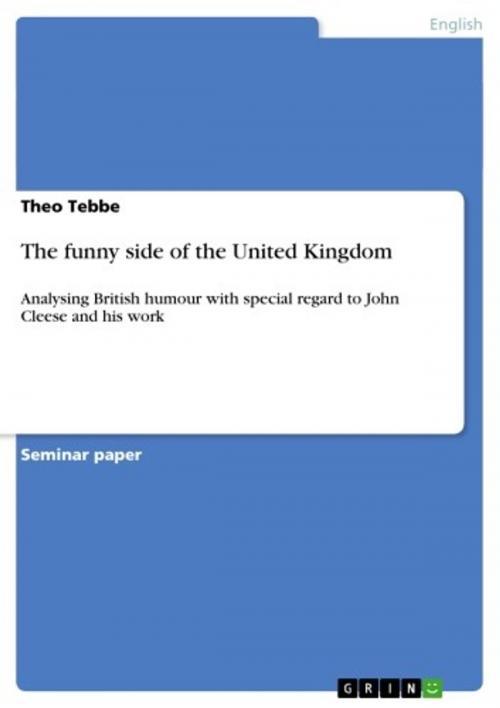The funny side of the United Kingdom
Analysing British humour with special regard to John Cleese and his work
Nonfiction, Entertainment, Drama, Anthologies| Author: | Theo Tebbe | ISBN: | 9783640169467 |
| Publisher: | GRIN Verlag | Publication: | September 18, 2008 |
| Imprint: | GRIN Verlag | Language: | English |
| Author: | Theo Tebbe |
| ISBN: | 9783640169467 |
| Publisher: | GRIN Verlag |
| Publication: | September 18, 2008 |
| Imprint: | GRIN Verlag |
| Language: | English |
Seminar paper from the year 2007 in the subject English Language and Literature Studies - Linguistics, grade: 1,7, University of Osnabrück, course: British Life and Times , 21 entries in the bibliography, language: English, abstract: If people who are living outside the United Kingdom are asked to characterise British humour, many of them will probably mention the jokes of one of the Monty Python series or maybe famous quotes from the British sitcom Fawlty Towers; and if you ask these people which person they would associate with the shows, the answer will probably be: John Cleese. He is well known in nearly all European countries and even in the United States. But how did he become that famous or maybe even a label for today's view on English humour? In my research paper I want to point out Cleese's significance for British Comedy and humour. At first, I would like to give a general definition of the term and at the same time look at different types of humour in order to investigate why people start grinning or laughing in certain situations. I will present some criteria which can detect different types of humour and consider humour on phonological and syntactical levels. Then I want to work out if there is a special concept of humour in the United Kingdom and if this humour even characterises the British culture. In a next step I will compare the stereotypical concept of British and German humour to show that they are at least rated as being contradictory. After I have shown some typical styles and techniques of the British humour, my central focus will be on John Cleese. I want to give an overview of his life and introduce people who are close to him or supported him in his career. In doing so I will also concentrate on his major achievements: e.g. Monty Python's Flying Circus and their films and Fawlty Towers. Their popularity throughout the world is really remarkable and shows that Cleese and his friends possibly managed to broadcast a new sense of humour. I will therefore finally analyse their and particular Cleese's share in British sense of humour.
Seminar paper from the year 2007 in the subject English Language and Literature Studies - Linguistics, grade: 1,7, University of Osnabrück, course: British Life and Times , 21 entries in the bibliography, language: English, abstract: If people who are living outside the United Kingdom are asked to characterise British humour, many of them will probably mention the jokes of one of the Monty Python series or maybe famous quotes from the British sitcom Fawlty Towers; and if you ask these people which person they would associate with the shows, the answer will probably be: John Cleese. He is well known in nearly all European countries and even in the United States. But how did he become that famous or maybe even a label for today's view on English humour? In my research paper I want to point out Cleese's significance for British Comedy and humour. At first, I would like to give a general definition of the term and at the same time look at different types of humour in order to investigate why people start grinning or laughing in certain situations. I will present some criteria which can detect different types of humour and consider humour on phonological and syntactical levels. Then I want to work out if there is a special concept of humour in the United Kingdom and if this humour even characterises the British culture. In a next step I will compare the stereotypical concept of British and German humour to show that they are at least rated as being contradictory. After I have shown some typical styles and techniques of the British humour, my central focus will be on John Cleese. I want to give an overview of his life and introduce people who are close to him or supported him in his career. In doing so I will also concentrate on his major achievements: e.g. Monty Python's Flying Circus and their films and Fawlty Towers. Their popularity throughout the world is really remarkable and shows that Cleese and his friends possibly managed to broadcast a new sense of humour. I will therefore finally analyse their and particular Cleese's share in British sense of humour.















